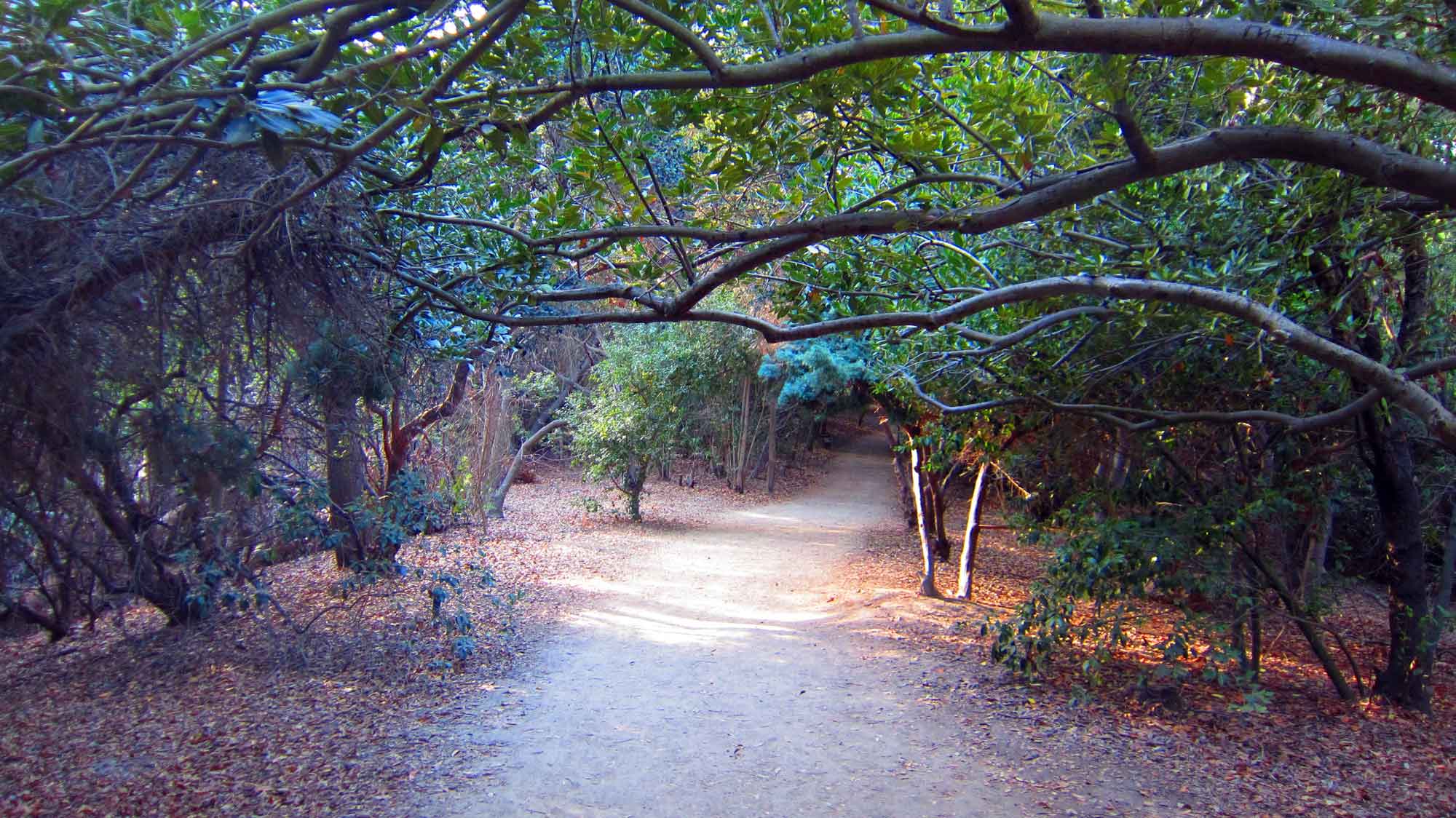I trudge up the hill, alone in the dark.

This is the hill that the kids came to in their cars all those years ago, after football games, after Friday night dances, and I can almost hear the giggling and the urgent exhortations. Boys and girls parking beneath the oil derricks on this desolate piece of land, a giant hump right in the middle of the city, lit by no light but the moon, disturbed by no sound but the grind and screech of the big oil pumps, sucking life from the hill like huge iron mosquitoes. The oil had mostly dried up ten years earlier, but a few pumps remained to make sure that every drop was sucked out. A lot of the derricks were still there, too, standing silent watch, ten-story weathered wooden lattices, relics of the drilling, no longer needed but not worth tearing down. The pumps huddled indifferently under their bases, pumping always.
Once you got to the top and parked the car, the view was breathtaking. This was before the streetlights were orange, and in the night the city stretched like a glittering sequined sheet all the way to the harbor, and the black ocean beyond could have been the very edge of the universe. You felt like you were flying, just standing there next to the car. I did, anyway. I might have been the only kid who actually saw the view, because even though I had a car, I never took a girl up there, to watch the submarine races, as we used to call it. I cruised it enough times, though, to know what it looked like, and I felt good up there alone, above it all, needing no one.
It’s the steepest hill in the region, and back then the pavement ended halfway up. Above that were just the twisting oil company access roads, dirt and gravel. No one lived up here, the derricks your only witness, except for the occasional squad car. Tonight as I walk, high-priced apartments line the freshly blacktopped roads, cheaply built boxes put here to cash in on that view, contoured into fancy-looking architectural shapes through the magic of styrofoam. The hill has been remade, too, primped up with landscaping and terraced lots for the houses, cut sharply into the earth. The derricks are all gone now, and the few stubborn oil pumps are hidden artfully behind stands of palms and local shrubs.
Once there was a nightclub at the very top of this hill. You’d drive along the deserted road in total darkness for a quarter-mile, you’d be aware of music playing somewhere, then abruptly you’d come upon a dirt parking lot lit by a few bare floodlights on makeshift poles. At the far end of the lot was the nightclub, looking like an island of corruption. An impossibly garish neon sign blinked
DANCING.
The hill had its own police department, company security left over from the oil boom, and maybe that’s why the ID check at the door was not as rigorous as in the city below. For whatever reason, my friends drank there. Come on, Jones, the Lost Boys would say. They don’t care how old you are, as long as you’re spendin’ money. I didn’t see the fascination, and my fear of being thrown out was greater than my curiosity. I regret not going now, like so many things I didn’t do.
In the end, I played in the band there, so I saw the place anyway, from the inside. I was too afraid to go in there just to see if I could fool them, but it was OK to do it if they paid me. I was not old enough to be working there, but no one ever asked about that. On stage I was a screaming showoff, shouting the blues like I meant it, but during the breaks I disappeared into the shadows, the better not to get found out and ejected. The irony of this behavior eluded me at the time. Strangely, none of my smartass friends ever saw me perform there, and eventually I came to wonder if they really ever went there.
Now I live in the shadow of the hill, and tonight I cruised it, like I used to. I don’t know what happened to the old roads. They’re not merely gone – their spirit is erased. There are guardrails and asphalt where once there were abandoned jalopies and loose gravel. Somehow, intersections and street signs have been contrived. The seedy nightclub has been razed and at the top, there’s a little park, a lookout point with a stone wall around the perimeter, concrete benches and a statue. Even the park is two-thirds paved.
I leave the car a few blocks down and walk up toward the park. I wonder if any of the boys and girls who used to make out here in cars are living in these town homes, and if so, are they living with the ones they made out with? When I reach the top there are teenagers there, some couples, some groups. I’m pretty sure I know what has drawn them here, but they are safely contained in the bright enclosure, so their natural urges are stymied.
I stand at the stone wall, and the view is still breathtaking. The streetlights below are mostly orange now – is that what makes it less magical? Or is it that we know each other better now, the city and me? I own a piece of it, and it owns a piece of me. I think about flying over the city, like I did when I was a kid, but instead I just feel like I’m falling, and in fact I stagger back from the stone wall, catching myself before I actually take off. After that I leave the teenagers behind, as I always have, and go back to my car.
When I get there, I stand by the side of the road and take in the unauthorized view for a final moment. The city has grown. It is so big and bright now that it eclipses the stars and dims the moon. It is full of living, dying, trying, crying. And out past the harbor, the very edge of the universe seems closer than ever.


interesting!
I haven’t seen this kind of writing from you in a while. It’s good and real and weary yet hopeful. It makes me want to start writing again, but my muse has left me in this indian summer of my discontent.
this is a beauty.
I relish the times when you allow us to visit the places you’ve been. After this captivating trip, I feel like I should pay more attention to my own minor adventures.
Would you take me to that hill?
Humour and last laugh – I’m honored you think so.
Aydreeyin – The Muse does come and go, doesn’t she?
kStyle – …and you’re a peach.
Theresa – Your minor adventure might be my life-changing event.
No Bad Days – Maybe it’s about time I took someone up there.
I love this writing style on you, it looks fantastic everytime you wear it & I never get tired of seeing it.
“no sound but the grind and screech of the big oil pumps, sucking life from the hill like huge iron mosquitoes.” Love that.
As much as you’ve expressed your dislike of poetry, I think you’d do well there too. Your language is very poetic here & your imagery is always fantastic.
T1 – Thank you for the kind words. It truly feels good. And I don’t dislike poetry – I just don’t think I can write it, and I rarely understand it. Or maybe never, I’m not sure.
Awesome, Larry.
Holly – It’s good to see you’re still here. Hang in, babe.
I’m hangin’ in so far. Lots of drama and divorce going on in my life lately. Its nice to come here and read somehting so well written. I found myself on that hill and outside my head for a minute. Thanks.
I have to tell you that you write lovely posts…
I finally had time to read this, Larry, and it was a joy. Please write again soon.
Signal Hill cops had bad, bad reputations in those days. There were rumors that if you were caught by an S.H. cop screwing a girl that the cop would lift you off her body and take your place. That’s what my stepfather told me. I was pretty surprised, and by two things: first the basic allegation, and second by the fact that my stepfather thought it was remotely possible that I’d be screwing a girl. This was 1965 and I was 17, and things were very different back then, and far better than today, I believe, because small things — like holding hands — could be so profoundly thrilling. A few years later, a promising college basketball star named Ron Settles was arrested on Signal Hill, and the next morning he was found dead in his cell, hanging by his belt from the ceiling. It was ruled a suicide. It was said that he was mortified by his arrest and killed himself rather than face his mother, Of course, everyone knew that was not the truth, and everyone knew the salient fact was that Settles was a black guy caught on the Hill. Many people said, “Well, it’s Signal Hill,” in the way the Jack Nicholson character said “It’s Chinatown” in that movie a few years later. I think I know Signal Hill in the way that Larry Jones does. In fact, he and I were both invited to neck there by a girl named Linda (last name began with T), something we didn’t learn for 20 years or so, but we were too much the gentlemen to take her up on it. My fervent hope is that Linda’s feelings were not hurt. But who knows, she might have been waiting for us to say, “Yes, Linda, let’s go,” whereupon she could have said, “Are you fucking kidding me? Me, make out with a nerd like you?” Then she would have laughed so hard that she had to vomit.